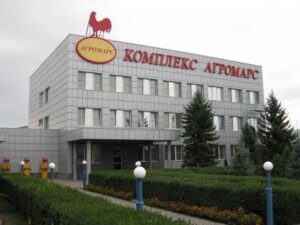
PJSC State Food and Grain Corporation of Ukraine in the 2017/2018 marketing year (MY, July-June) shipped more than one million tonnes of grain to China National Complete Engineering Corporation (CCEC), which is twofold more than for the previous MY.
According to a report on the website of the state corporation, the corporation through its main partner CCEC exports grain to Austria, France, Portugal, the Netherlands, Italy, Egypt, Algeria, Bangladesh, and Tunisia.
The government in August 2010 decided to create the State Food and Grain Corporation of Ukraine. The corporation has a chain of branches, comprised of grain storage facilities, flourmills, fodder factories and a cereals factory. The 53 subdivisions of the corporation can store a total of 3.75 million tonnes of grain, which includes the grain handling capacities of Odesa and Mykolaiv ports of some 2.5 million tonnes of grain cargo per year.

Ukraine since the beginning of the 2018/2019 marketing year (MY, July-June) and as of July 18 had exported 891,000 tonnes of grain.
According to the Ministry of Agrarian Policy and Food, to date the country exported about 278,000 tonnes of wheat, 269,000 tonnes of barley, and 344,000 tonnes of corn.
In addition, 1,900 tonnes of flour had been exported on that date.
As reported with reference to the ministry, according to preliminary data, Ukraine in the 2017/2018 MY (July-June) exported 39.4 million tonnes of grain.

The index of consumer confidence of Ukrainians in June 2018 after a three-month positive trend increased by 2.7 points, to 65.6 (hereinafter on a scale from zero to 200) compared with the May index, and in annual terms it showed an increase of 6.2 points, according to a monthly research by GfK Ukraine. According to research, the index of current personal financial standing showed the greatest positive dynamics, having increased by 8.8 points in comparison with May 2018, to 59.6. “This result might be associated with the gradual growth of real income of the population, as well as with the fact that there is decline in prices of basic food commodities in summer,” GfK Ukraine analysts note.
The index of expected changes in personal financial standing rose by 6.2 points, to 67.3, and in general the index of the current situation in monthly comparison grew by 5.1 points, to 65.5 points, GfK Ukraine said.
Ukrainians in June this year were optimistic about the expectations of the country’s economic development over the next five years: the corresponding index rose by 3.3 points compared to the May figure, to 56.4. Ukrainians also showed a propensity for optimism with respect to inflation expectations: this index fell by 3.4 points, to 187, the study shows.

Agromars Complex LLC (Kyiv region) intends to build a plant for processing bio waste, according to the company’s website. “We discussed the design and construction of a bio waste processing plant with the leadership of the German company Kablitz. We agreed to build a plant for processing chicken manure with other waste to generate heat and electricity,” deputy technical director of the company Oleksandr Surmach said.
The company said the plant would process 330 tonnes of manure per day, producing 4.4 MWh of heat and 6.2 MWh of electricity. The preliminary construction period of the facility is about two years. The payback period is three or four years. For the construction of the plant, Agromars plans to raise funds from the European Bank for Reconstruction and Development. “Agromars plans to sell electricity to the state at a feed-in tariff. Today the German company is preparing a commercial offer. In the near future, we will sign a cooperation agreement,” the company said.
Agromars is the second largest producer of poultry in Ukraine (the Havrylivski Kurchata brand), a vertically integrated holding with a closed production cycle.

The German-Japanese engineering company Sumitomo Electric Bordnetze (SEBN) plans in two months to open the first stage of a plant for production of automotive electrical wiring in the premises of Khmelnytsky Mechanical Plant purchased by the investor. According to the website of Khmelnytsky Regional State Administration, today some of the premises have been repaired, there is already the management of the plant, employees are being hired. According to SEBN representatives, it is planned by the end of the year to create 500 new jobs, and with the expansion of production their number will grow to 2,000 people.
“PrJSC Khmelnytsky Mechanical Plant was included in the list of debtors, but with the assistance of local authorities it became possible to resolve the issues and sign an amicable agreement, which contributed to the rapid purchase of the object by Sumitomo Electric Bordnetze,” the report says.
As reported, Sumitomo Electric Bordnetze, the cable network manufacturer for Volkswagen Concern, opened the first Sumitomo Electric Bordnetze-Ukraine plant in the village of Baikivtsi in Ternopil region (the number of employees is 4,400) in 2006.
AUTOMOBILE, ENGINEERING COMPANY, GERMAN-JAPANESE, SEBN, WIRING PLANT